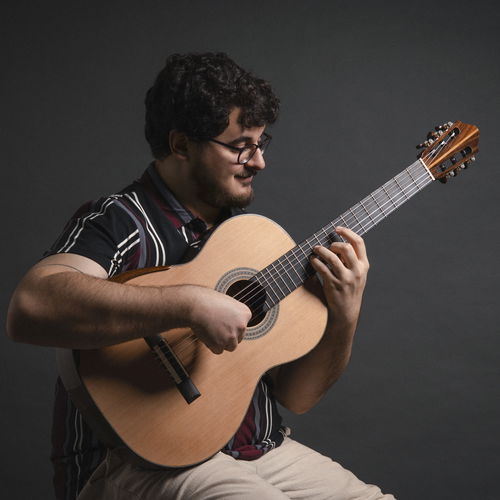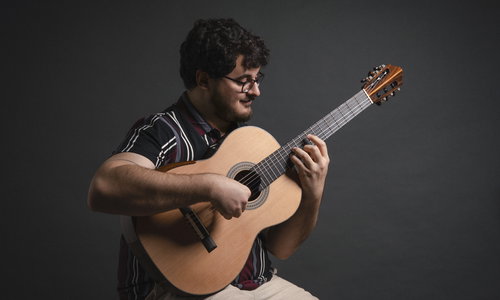Classical Guitar Treasures
Details
Octavio Deluchi full profile / Solo Guitar / 1 musician
Full program notes
The guitar is one of the most played instruments around the world not by coincidence. Among different factors such as size, portability, or access, a key factor for that is its repertoire. There are a lot of mesmerizing pieces, because of their capacity to hypnotize the listeners with their melodies, and the amount of effects and virtuosity one has to present in order to perform it. The program “Classical Guitar Treasuresres” presents five composers from different times to showcase the instrument possibilities.
Bach, one of the most famous composers in the globe, demonstrates the variety of alternatives for the instrument in a wonderful lute suite. BWV 995, originally for the lute, is a transcription done by Bach himself for the lute, using BWV 1011 as the original source, the fifth Cello suite. The guitar enhances the harmonic possibilities at the same time allows more polyphonic resources to get the spotlight.
Dionisio Aguado is one of the great virtuosos from his time, and his series of Rondós is a great example of the level of achievement of his time. With very contrasting sections, the performer is highly demanded in this 10-minute-long piece, which more likely narrates an epic romance rather than a mere rondo form. Next, Johann Mertz, representing the romantic period for the guitar, was known to almost do magic with only ten strings on his guitar. At least that is what some reports and documents from his time attest. Mertz’s “Hungarian Fantasy” shows how much the guitar transformed in a short period of time, since Aguado. With a thrilling final section, it is not by coincidence that Johann is a contemporary of Liszt and wrote a piece with a similar title: we can almost say it is the guitar version of Liszt’s “Hungarian Fantasies”.
Joaquin Rodrigo demonstrates what it is to be a Spanish composer in the 20th century. One may check all the lines when it comes to the guitar: Spanish composer, who collaborated with Segovia, neo-classical style, he utilizes dances and classical forms, heavily inspired by the music of his own country, and uses a lot of effects well written for the instrument, such as repeated notes, rasgueados and the use of open strings for the chords.
To finish in great style with a short piece, Piazzolla is the most recent composer of this curation. Just the name by itself creates a lot of expectations, and this is not for less. This dance-like piece is the South American tango at its peak. It delivers different characters throughout a three-minute journey, but it is just right to make us electric with the rhythmic precision of the tango and the polyphonic lines present in Piazzolla’s writing, masterfully adapted for solo guitar by no one more than Sergio Assad.
Program:
Johann Sebastian Bach - BWV 995
Dionisio Aguado y Garcia - Andante y Rondó Op. 2 nº 4
Johann Kaspar Mertz - Hungarian Fantasy
Joaquin Rodrigo - Three Spanish Pieces
I - Fandango
II - Passacaglia
III - Zapateado
Astor Piazzolla - Verano Porteño (Arr. Assad)
Videos from this player
Audio from this player
Heitor Villa-Lobos - Etude nº 7 (Octávio Deluchi) - Live
Luigi Legnani - Caprice nº 7 (Octávio Deluchi)
Heitor Villa-Lobos - Prelude nº 2 (Octávio Deluchi)
Other programs from this ensemble
- Musician profile: Octavio Deluchi
-
Instruments: Solo Guitar

 Continue with Facebook
Continue with Facebook
 Continue with Google
Continue with Google
 Continue with Apple
Continue with Apple
